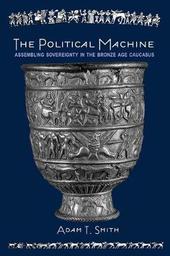
|
The Political Machine: Assembling Sovereignty in the Bronze Age Caucasus
Hardback
Main Details
| Title |
The Political Machine: Assembling Sovereignty in the Bronze Age Caucasus
|
| Authors and Contributors |
By (author) Adam T. Smith
|
| Series | The Rostovtzeff Lectures |
|---|
| Physical Properties |
| Format:Hardback | | Pages:264 | | Dimensions(mm): Height 235,Width 152 |
|
| Category/Genre | Archaeology by period and region |
|---|
| ISBN/Barcode |
9780691163239
|
| Classifications | Dewey:939.53 |
|---|
| Audience | | Tertiary Education (US: College) | | Professional & Vocational | |
|---|
| Illustrations |
9 Maps
|
|
Publishing Details |
| Publisher |
Princeton University Press
|
| Imprint |
Princeton University Press
|
| Publication Date |
7 July 2015 |
| Publication Country |
United States
|
Description
The Political Machine investigates the essential role that material culture plays in the practices and maintenance of political sovereignty. Through an archaeological exploration of the Bronze Age Caucasus, Adam Smith demonstrates that beyond assemblies of people, polities are just as importantly assemblages of things--from ballots and bullets to c
Author Biography
Adam T. Smith is professor of anthropology and chair of the Department of Anthropology at Cornell University. He is the author of The Political Landscape and the coauthor of The Archaeology and Geography of Ancient Transcaucasian Societies, Volume 1.
Reviews"The coherence and brevity of the book reflects its development from the 2013 Rostovtzeff Lecture Series at New York University. The book can be read quickly, and its significance for evolutionary studies can be assimilated thoughtfully. It deserves to be read broadly by academics, graduate students and an interested public."--Timothy Earle, Antiquity "I most strongly recommend this as a book with which to argue, for all interested in the newest forms of theory concerning politics and objects, as well as anyone examining ancient Eurasian cultural forms and connections."--Chris Gosden, American Anthropologist "The Political Machine surely succeeds in bringing the political back into the mainstream of archaeological theory. Smith's provocative work will be studied by all interested in ontology and the epistemology of things, and by archaeological theorists."--Geoffrey D. Summers, Bryn Mawr Classical Review
|